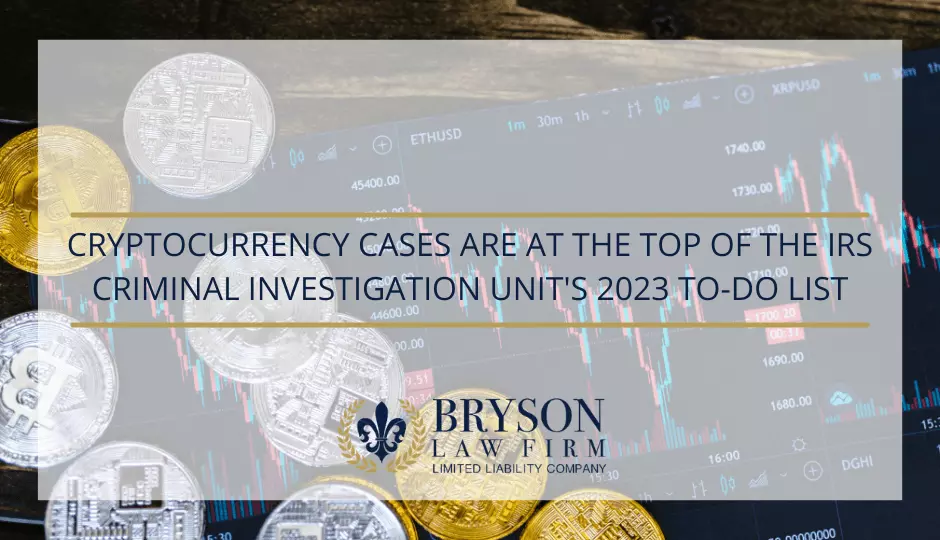We’re hearing about it more and more – cryptocurrency. Digital currency, or “Virtual Currency”/”Digital Assets” as the IRS calls it, particularly cryptocurrency, is becoming a rather popular form of investment for Taxpayers and is also increasingly becoming a point of interest for the IRS. The IRS’ Criminal Investigation Division has recently announced that cryptocurrency cases will top their criminal investigation “to-do” list in 2023. Let’s take a closer look at the tax implications of cryptocurrency transactions and what Taxpayer can expect from the IRS when it comes to cryptocurrency moving forward.
In 2014, the IRS released Notice 2014-21 which explained that virtual currency is to be treated as property for income tax purposes. When virtual currency is sold, capital gains and losses must be recognized on the sale, subject to any limitations on the deductibility of capital losses. Most sales and other capital transactions will be reported on a Form 8949 – Sales and Other Dispositions of Capital Assets and summarized on a Schedule D – Capital Gains and Losses.
The IRS Form 1040 Schedule 1 – Additional Income and Adjustments to Income asks whether a Taxpayer has received, sold, sent, exchanged, or otherwise acquired any financial interest in virtual currency. If the only transactions that occurred in a tax year were purchases of virtual currency with real currency, the Taxpayer should answer “No” to this question. All other virtual currency transactions will likely need to be reported with a “Yes” answer to this question.
Short-term and long-term capital gain/loss rules typically apply. The holding period begins the day after the virtual currency is acquired. If the virtual currency was held for less than one year before sale or exchange, there is a short-term capital gain or loss. If the virtual currency was held for more than one year, there is a long-term capital gain or loss. The gain or loss is the difference between the adjusted basis in the virtual currency (the amount spent to acquire the virtual currency including fees and commissions) and the amount the Taxpayer received in exchange for the virtual currency.
A lot of questions regarding the taxability of virtual currency transactions involves “hard forks.” The IRS’ Revenue Ruling 2019-24 discusses these issues. A hard fork occurs when cryptocurrency undergoes a protocol change which may result in a creation of a new cryptocurrency. If a Taxpayer’s cryptocurrency went through a “hard fork” but the Taxpayer did not receive any NEW cryptocurrency, there is no taxable event. If the Taxpayer receives NEW cryptocurrency as a result, the Taxpayer will have taxable income in the year that the Taxpayer received the new cryptocurrency. In this situation, the cost basis is calculated by looking at the fair market value of the new cryptocurrency, which is the amount included as income on the income tax return.
The IRS’ 2022 draft instructions for the Form 1040 have recently been released and provide additional guidance to Taxpayers with respect to virtual currency transactions. The term “Virtual Currency” has been replaced with “Digital Assets” which is defined as “any digital representations of value that are recorded on a cryptographically secured distributed ledger or any similar technology” which includes “non-fungible tokens (NFTs) and virtual currencies, such as cryptocurrencies and stablecoins.”
In the IRS’ Criminal Investigation Division’s 2022 Annual Report, the IRS stated that “digital assets pose a significant risk of facilitating money laundering, cybercrime, and ransomware, narcotics and human trafficking, terrorism, and proliferation financing. Digital assets may also be used as a mechanism to circumvent U.S. tax law and financial sanctions.” As a result, cryptocurrency is a priority to this division of the IRS in 2023. The IRS has created the Office of Cyber and Forensic Services to aid in these efforts.
Need help with virtual currency transactions and taxes? Contact Bryson Law Firm, LLC today.






















